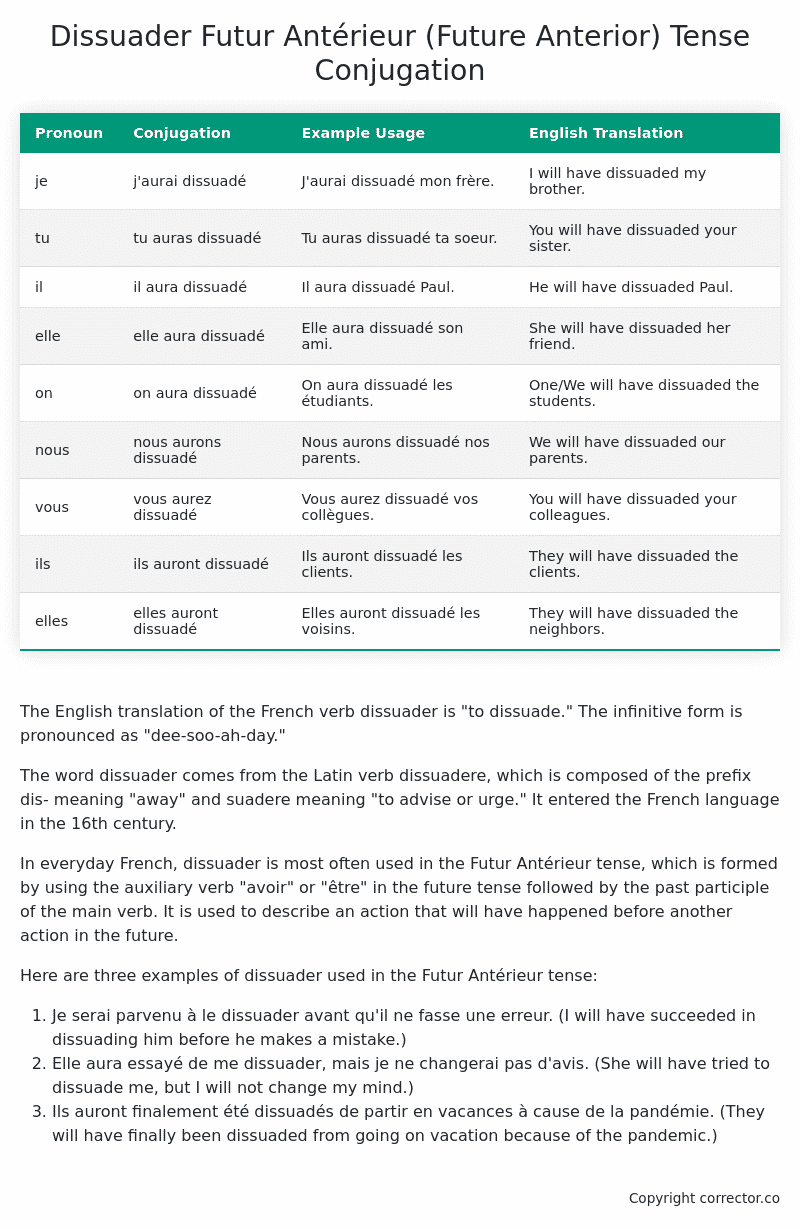Futur Antérieur (Future Anterior) Tense Conjugation of the French Verb dissuader
Introduction to the verb dissuader
The English translation of the French verb dissuader is “to dissuade.” The infinitive form is pronounced as “dee-soo-ah-day.”
The word dissuader comes from the Latin verb dissuadere, which is composed of the prefix dis- meaning “away” and suadere meaning “to advise or urge.” It entered the French language in the 16th century.
In everyday French, dissuader is most often used in the Futur Antérieur tense, which is formed by using the auxiliary verb “avoir” or “être” in the future tense followed by the past participle of the main verb. It is used to describe an action that will have happened before another action in the future.
Here are three examples of dissuader used in the Futur Antérieur tense:
- Je serai parvenu à le dissuader avant qu’il ne fasse une erreur. (I will have succeeded in dissuading him before he makes a mistake.)
- Elle aura essayé de me dissuader, mais je ne changerai pas d’avis. (She will have tried to dissuade me, but I will not change my mind.)
- Ils auront finalement été dissuadés de partir en vacances à cause de la pandémie. (They will have finally been dissuaded from going on vacation because of the pandemic.)
Table of the Futur Antérieur (Future Anterior) Tense Conjugation of dissuader
| Pronoun | Conjugation | Example Usage | English Translation |
|---|---|---|---|
| je | j’aurai dissuadé | J’aurai dissuadé mon frère. | I will have dissuaded my brother. |
| tu | tu auras dissuadé | Tu auras dissuadé ta soeur. | You will have dissuaded your sister. |
| il | il aura dissuadé | Il aura dissuadé Paul. | He will have dissuaded Paul. |
| elle | elle aura dissuadé | Elle aura dissuadé son ami. | She will have dissuaded her friend. |
| on | on aura dissuadé | On aura dissuadé les étudiants. | One/We will have dissuaded the students. |
| nous | nous aurons dissuadé | Nous aurons dissuadé nos parents. | We will have dissuaded our parents. |
| vous | vous aurez dissuadé | Vous aurez dissuadé vos collègues. | You will have dissuaded your colleagues. |
| ils | ils auront dissuadé | Ils auront dissuadé les clients. | They will have dissuaded the clients. |
| elles | elles auront dissuadé | Elles auront dissuadé les voisins. | They will have dissuaded the neighbors. |
Other Conjugations for Dissuader.
Le Present (Present Tense) Conjugation of the French Verb dissuader
Imparfait (Imperfect) Tense Conjugation of the French Verb dissuader
Passé Simple (Simple Past) Tense Conjugation of the French Verb dissuader
Passé Composé (Present Perfect) Tense Conjugation of the French Verb dissuader
Futur Simple (Simple Future) Tense Conjugation of the French Verb dissuader
Futur Proche (Near Future) Tense Conjugation of the French Verb dissuader
Plus-que-parfait (Pluperfect) Tense Conjugation of the French Verb dissuader
Passé Antérieur (Past Anterior) Tense Conjugation of the French Verb dissuader
Futur Antérieur (Future Anterior) Tense Conjugation of the French Verb dissuader (this article)
Subjonctif Présent (Subjunctive Present) Tense Conjugation of the French Verb dissuader
Subjonctif Passé (Subjunctive Past) Tense Conjugation of the French Verb dissuader
Subjonctif Imparfait (Subjunctive Imperfect) Tense Conjugation of the French Verb dissuader
Subjonctif Plus-que-parfait (Subjunctive Pluperfect) Tense Conjugation of the French Verb dissuader
Conditionnel Présent (Conditional Present) Tense Conjugation of the French Verb dissuader
Conditionnel Passé (Conditional Past) Tense Conjugation of the French Verb dissuader
L’impératif Présent (Imperative Present) Tense Conjugation of the French Verb dissuader
L’infinitif Présent (Infinitive Present) Tense Conjugation of the French Verb dissuader
Struggling with French verbs or the language in general? Why not use our free French Grammar Checker – no registration required!
Get a FREE Download Study Sheet of this Conjugation 🔥
Simply right click the image below, click “save image” and get your free reference for the dissuader Futur Antérieur tense conjugation!

Dissuader – About the French Futur Antérieur (Future Anterior) Tense
Construction
Common Everyday Usage Patterns
Interactions with Other Tenses
For example
Summary
I hope you enjoyed this article on the verb dissuader. Still in a learning mood? Check out another TOTALLY random French verb conjugation!


